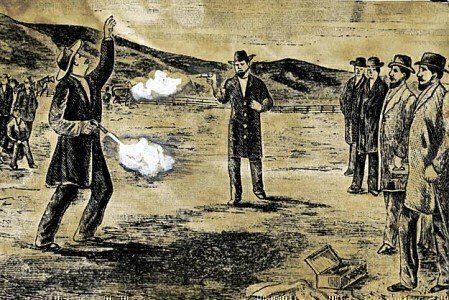On the anniversary of the Burr-Hamilton duel, a look back at history shows the event wasn't unique when it came to early-19th-century squabbles.
 Dueling was technically illegal in the United States, but even prominent government leaders engaged in the practice--Aaron Burr, for example, was serving as vice president when he met his rival Alexander Hamilton face-to-face in Weehawken, New Jersey. On July 11, 1804, the men met to end a decades-long feud. Both men fired, but only Hamilton was hit. He later died from his injuries.
Dueling was technically illegal in the United States, but even prominent government leaders engaged in the practice--Aaron Burr, for example, was serving as vice president when he met his rival Alexander Hamilton face-to-face in Weehawken, New Jersey. On July 11, 1804, the men met to end a decades-long feud. Both men fired, but only Hamilton was hit. He later died from his injuries.
Alexander Hamilton was far from the only famous American to be involved in a duel--or get killed in one.
Jackson vs. Dickinson
One of most famous duels involved Andrew Jackson and Charles Dickinson. In 1806, the two men met in combat after Dickinson insulted Jackson’s wife. Dickinson was regarded as one of the best duelers in America. Jackson was a fearless soldier. The future president survived Dickinson’s first shot but Jackson's pistol jammed. In a breach of the code duello, Jackson re-cocked his pistol and killed Dickinson.
Benton vs. Lucas
Another frequent dueler was Thomas Hart Benton, who fought with Jackson, and had two duels with a rival attorney, Charles Lucas. Benton killed Lucas in their second duel in 1817. As a senator, Benton became Jackson's right-hand man in Congress.
Decatur vs. Barron
In 1820, a top Navy commander, Stephen Decatur, died in a duel with a former naval commander, James Barron. Barron apologized to Decatur as he fell wounded. Decatur accepted, saying it was an honorable duel.
Graves vs. Cilley
Two members of the House of Representatives fought in a fatal 1838 duel, when Kentucky Representative William Jordan Graves killed Maine Representative Jonathan Cilley. Graves was sent to deliver a dueling invitation from New York newspaper editor James Webb, but he wound up fighting Cilley. The Supreme Court boycotted the funeral in protest.
Lincoln vs. Shields
Then, in 1842, an Illinois state legislator got in hot water after he allegedly published a letter insulting state auditor James Shields. Shields challenged the author of the letter to a duel. The alleged author: Abraham Lincoln. By the time the two men met for the duel, however, the duelers' seconds were able to convince them to settle on the grounds that Lincoln was not responsible for the letters. It didn't hurt that Lincoln towered over his opponent. Lincoln, as we know, later became president, and Shields became a general.
Clay vs. Randolph
Perhaps the oddest duel was between Secretary of State Henry Clay and Senator John Randolph in 1826. A known hothead, Randolph accused Clay of “crucifying the Constitution and cheating at cards” in a speech on the Senate floor.
Randolph was a much better dueler and didn’t want to kill the secretary of state, so he worked with another chronic dueler, Thomas Hart Benton, to purposely miss the first shot, so Clay would end the duel.
But Randolph’s pistol misfired just before the duel, and after Clay demanded that the duel continue, Randolph shot at Clay and just missed. Clay then shot and missed twice. Randolph went back to his original plan and shot above Clay. Cooler heads prevailed, and the two politicians shook hands and ended the duel.







